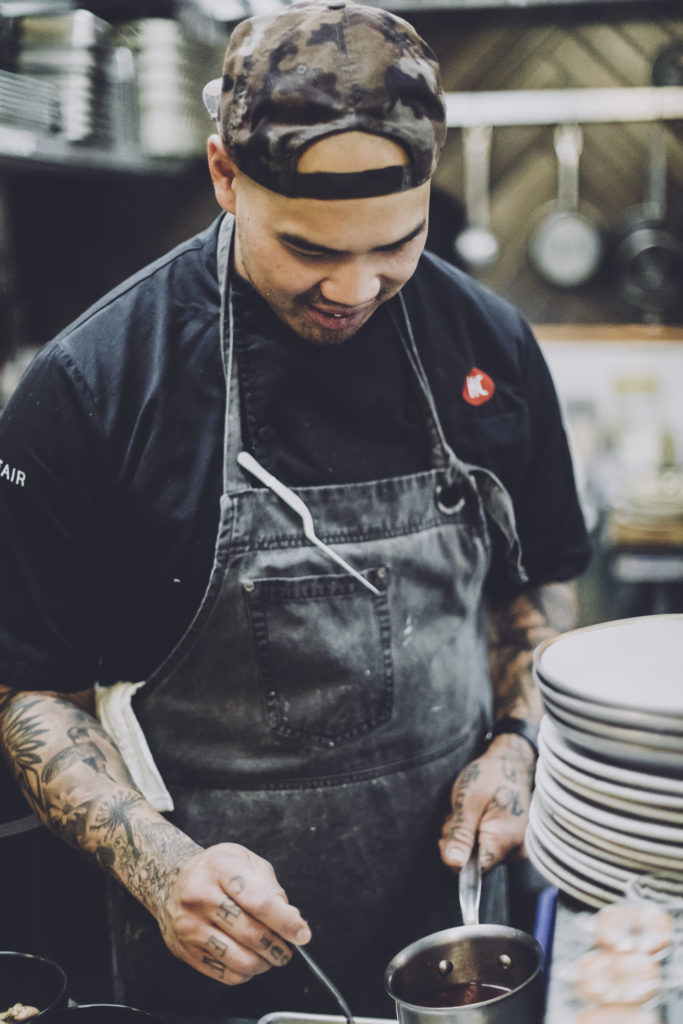AAJA-LA’s Kitchen Conversation Series
Top Chef Alum Chef Tu David Phu cooks up classic Vietnamese dishes & shares the stories behind them for AAJA-LA’s first-ever virtual cook along

By Hieu Gray
Chef Tu David Phu strikes an imposing figure in the kitchen and is a study in contrasts. He has a fighter’s physique while inhabiting the uncompromising artist’s penchant for precision. This dichotomy is often seen in his dishes which are influenced by both his Vietnamese upbringing in Oakland, CA and formal training at such fine dining establishment as Acquerello and Chez Panisse. He recently competed on season 15 of the hit reality tv show ‘Top Chef’ on Bravo. He has also completed a short documentary ‘Bloodline’ about how his parents played a pivotal role in his growth as a chef. He has made it his life’s work to bring the flavors of Vietnam to the world.
In our interview with the award-winning chef, he opens up about his influences and future projects.
What made you want to become a chef?
I am first generation Vietnamese American from Oakland. My parents are refugees. And we come from very humble beginnings. Unlike most of my colleagues and peers in the food space, their food stories are filled with abundance. Mine was the opposite. And to further reflect, there is one childhood food memory that sticks out for me; soup made with chicken bones. In my adolescent years, chicken bones were given away (not sold) at butcher markets and counters; basically, they were free. If my mother was lucky, she would be prized with chicken bones to bring home to make soup to eat with rice. On days that she wasn’t so lucky, it would just be rice or instant noodles.
The lack of nutrient dense foods (food variety/selection) in my childhood resulted in my emotional obsession of food. Food was an emotional element that had roots of everything that “made me feel good” that was a contrast to my home environment. Naturally, I would find refuge in the kitchen.
What was your experience like on Bravo’s Top Chef?
Top Chef was amazing. It was a great learning experience. Specifically, learning about my limits and boundaries. I’d do it again in a heartbeat. Beyond the experience, I am so grateful for the opportunity to contribute my origin and family’s narrative on a world stage such as Top Chef.
Can you tell us a little more about your upcoming projects?
I am creating digital content with brands on social media platforms such as [IG, TikTok, YouTube]. I just started a YouTube Channel Cooking with Chef Tu. I am currently filming a slew of episodes to post this spring. My e-commerce store www.tumamispices.com which had amazing success in its 2nd month during the holiday. Continuing to find opportunity to create/host a TV show that has theme/narrative around untold stories around food.
How has the Covid pandemic affected you?
Like my peers in the tourism and hospitality sector, 2020 was very difficult for me. I do a lot of event appearances. And some speaking engagements and seldomly cook for private clients. 2019 was a good financial year for me. I head into 2020 with some savings. Jan 2020: We were fully funded to film 2 TV Shows [First Kitchen and Try This]. Feb. 2020: I got engaged. March 2020: Pandemic hits the USA hard. Shelter-In-Place is issued. We lose all of our funding for the TV Shows. All of my event gigs and appearances are canceled. All of 2020- my fiancé and I deplete our savings/wedding money to sustain ourselves. During the pandemic, I took time to learn new skill sets such as food photography and e-commerce. The result of that is www.tumamispices.com and brand partnerships and advisory roles I currently have on my channels. [Mark Levinson, Right Rice, Trex [Wagyu], etc.]
What has been your experience as a Vietnamese chef? Especially as a part of the diaspora.
For me, the dialogue around the complexities of diaspora (other than Jewish Diaspora) is fairly new in the United States. And as this conversation evolves, I notice terms such as “authentic’ start to dissipate. Terms such as “authentic” are conflicting because it creates a singular narrative around origin. The history of the world is much more complex than that. And all things that exist in our complex world (always) have had multiple origins. Ultimately, the use of the word “authentic” in culture and history undermines all things that don’t fit its narrative. For example, one claims that “authentic” ‘Pho’ is made only with beef. What about the village that makes their own version of pho with chicken? Does that make them “un-authentic?” Considering all the different provinces and regions in Vietnam, regional pho recipes will always reflect accessibility. Hence, my point: “Terms such as ‘authentic’ are conflicting because it creates a singular narrative around origin.” Diaspora explains how people, ingredients, cultures and traditions change in relation to time, in relation geographical locations. And you cannot describe the history of the world (specifically food) without the stories of diaspora.
If you would like to learn more about Chef Tu, he will be teaching a virtual cooking class as part of the Asian American Journalists Association – Los Angeles Chapter’s Kitchen Conversation Series on February 26 at 6pm PT via Zoom. For more information, go to: https://aajalakitchenconversation.eventbrite.com

